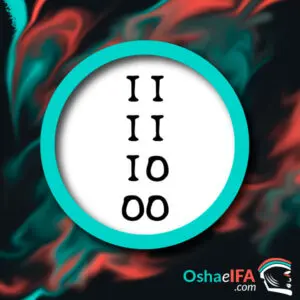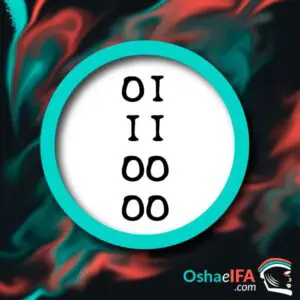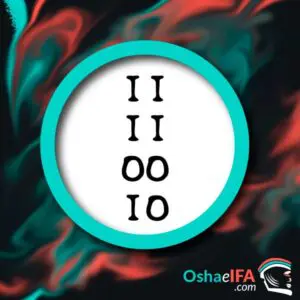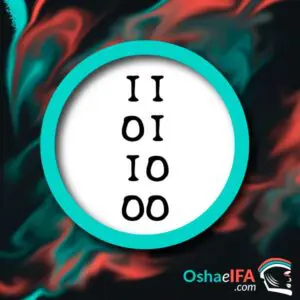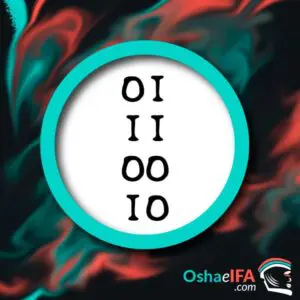Iroso Otrupon (Irosùn Òtúrúpòn)

Iroso Otrupon, sign number 87 in Ifá, offers valuable teachings on humility and managing our ego. Orunmila warns us against vanity and arrogance, pointing out that these attitudes can generate resentment in those around us, which could result in a lack of support when we need it most. This Odu represents the union between Irosùn and Òtúrúpòn.
Analysis and Interpretation of the Odu Iroso Otrupon
Iroso Otrupon is an Odu that warns about constant vigilance over one's actions and emotions, as well as the need to maintain integrity and patience in the midst of challenges and provocations. This sign teaches us through powerful metaphors about personal effort and perseverance, such as "the gardener who gave them his sweat to make the flowers smell", symbolizing dedication and personal sacrifice as essential elements to achieve beauty and harmony in our lives.
Economic Aspects
Economically, Iroso Otrupon warns about vigilance and caution. The sign speaks of theft and betrayal, suggesting the need to protect material assets and be cautious in investments and business. The metaphor of the “creation of towns in inhospitable places” teaches about the importance of innovation and the exploration of new markets, but always with caution.
"He who insists on making an impossible dream come true fails" warns us about caution in economic ambitions. Pursuing unattainable goals can lead to financial ruin, rather than the prosperity you long for, emphasizing the importance of setting realistic and achievable goals.
"Salud"
This Odu marks a strong connection with health problems related to stress and communicable diseases such as venereal diseases. The recommendation to take care of the blood and internal organs is essential, as well as avoiding risky behaviors that can lead to illness or injury. The story of “blood loss through the intestine” illustrates the physical vulnerability we can be exposed to if we do not take proper care of ourselves.
Religious Aspects
Iroso Batrupon emphasizes the importance of constant spiritual practice and respect for rituals and deities. The need to receive Ifá quickly to avoid spiritual deterioration is a call to action for those who follow this path. Respect for spiritual figures such as Obatalá and Shangó, mentioned in the sign, is crucial to maintaining harmony and balance in religious practice.
Personal relationships
Iroso Otrupon warns about difficulties in communicating and dealing with a partner, especially highlighting problems of despotism. The recommendation to treat your partner with respect and consideration and the warning of the consequences of not doing so illustrates the importance of empathy and mutual respect in maintaining healthy relationships. Furthermore, he emphasizes the value of gratitude and reciprocity in all human relationships, criticizing the lack of gratitude of those who benefit others.
Irosùn Òtúrúpò says: "When the boiler is broken, the water comes out and the candle goes out" reflects the delicate harmony in love relationships. This proverb teaches us that, just as a boiler needs integrity to maintain water, relationships require mutual trust and commitment to survive. If these qualities deteriorate, like a broken boiler, the relationship loses its essence and the warmth of love dissipates, leaving behind the coldness of heartbreak and disconnection.
Characteristics and Description of the Odu Iroso Otrupon
Names or Aliases:
- Iroso Otrupon.
- Iroso Batrupon.
- Iroso Gross.
- Iroso Batuto.
- Irosùn Òtúrúpòn.
What is born in the odu of Ifá Iroso Otrupon?
- Loss of blood through the intestine.
- The sense of hearing, which was given to Olorun by the hand of Orun, the omó of Ogue and the omó of Osanyin.
- The creation of peoples in inhospitable places.
- The gardener who, to make the flowers smell, gave them his sweat.
What does the Ifá sign Iroso Otrupon talk about?
- That the Awó's job is to speak and not lift weights.
- From venereal diseases.
- Of arguments in the ilé and that the woman wishes to leave her husband because he treats her with despotism or vice versa.
- That here Orúnmila disrespected Inle and Orishaoko and as punishment he became ill with gonorrhea.
- That the woman wants to be more than the husband.
- The vase, this Ifá orders to bathe with flowers.
- Let the aleyo that this Odu Iroso Otrupon see on him needs to receive Ifá quickly or else he will dry up little by little.
- That the woman is sick of her parts.
- Here Shango announces poverty and disaster.
- That there is someone who watches the person.
- To be careful with justice.
- Provocation by a person you are afraid of, by doing ebo they will not be able to handle you.
- That in this Ifá, Orúnmila invented the Ofa, because the wild beasts went to the town to decimate it.
- Iroko in this Irá.
- Obatalá, Shango and Egun.
The Iroso Bruto sign (Otrupon) indicates:
- Of the traveler who was looking for security and tranquility.
- Injustice.
- Fighting.
- Lack of appreciation from the one who receives your benefit.
- Of despotism with your wife that is why she wants to leave, give her a hand, because if she leaves you will have a lot of work, she was Oboñú and out of disgust she gave birth badly, since then she has been sick, take care of her and don't eat peanuts.
- From chasing enemies to rob and kill them.
- Of an envious person who receives help from others and, in return, they pay with bad gratitude.
Sayings of the Sign of Ifa Iroso Otrupon:
- When the boiler is broken, the water runs out and the candle goes out.
- The vain woman is like a golden nose in the nose of an ox.
- He who feels the heat and does not see the fire burns.
- He who insists on making an impossible dream come true fails.
- He who wants to be noticed wastes his time with the blind man.
- Both the rich and the poor depend on Olorun to live.
- The one who pawns the club, dies with the club.
- Thorns and ties are in the way of those who rebel against their destiny.
- Whoever sows vanity reaps contempt.
- Whoever shares his bread with the poor will never lack bread.
The saying "He who sows vanity reaps contempt" warns us about the consequences of cultivating superficial qualities. By prioritizing appearance over substance, one may end up reaping the disapproval and contempt of others, rather than genuine respect and admiration.
You can read: Ifa Otrupon Koso sign
Recommendations and Prohibitions:
Physical precautions:
- Medical Surveillance:
- Attention to possible abdominal and scrotal hernias.
- Special precaution in pregnancies to avoid abortions; The woman may have gynecological complications.
- General Care:
- Maintain constant care of the blood, stomach and internal organs to avoid adverse consequences.
- Avoid high-stress or conflict situations, and learn to control your temper to achieve positive long-term results.
Tips for Ifá Practitioners (Awó):
- Initiation Rituals: Be sure to swear to the godson in Orun and in Osanyin.
- Relationships with Godchildren: If a godson carries this Ifá in Atefa, keep distance to avoid serious conflicts. If you are a friendly Awó, minimize contact to preserve your well-being.
Specific Prohibitions:
- Physical Limitations:
- Avoid excessive physical exertion.
- Do not eat pork.
- Use caution when walking at night to avoid unexpected or disturbing encounters.
- Prudent Behavior:
- Reflect before acting to avoid making serious mistakes (avoid being Iroso Ogue, or Iroso Bruto).
- Perform ebo regularly to protect yourself from enemies.
- Keep your home closed in case of possible riots or external disturbances.
Ethical and Social Conduct:
- Despite the disappointments or ingratitude of others, continue to act with kindness and maintain your integrity. Be alert to pitfalls and bad advice that can lead you astray from your ethical path.
- The Awó does not raise his hand to women, only tranquility and security for their things.
You can read: Odu of Ifa Iroso Oshe (4-5)
Ifa Iroso Otrupon says:
Ifá advises that this man not keep secrets from his children. To ensure his success, Ifá will help him, but it is essential that he allows his eldest son to accompany him wherever he wants him to go and reveal his most guarded secrets so that he can learn from them.
When this Odu emerges during Igbodun, the person will be advised to prepare his own throne dedicated to Ogun, in addition to the thrones of Ifá and Eshu, so that he can find relief. This person is unlikely to achieve extreme prosperity in life.
In Iroso Batrupon divination, you will be advised to make sacrifices to ensure that your generosity is rewarded and not responded to with ingratitude.
If Iroso Otrupon manifests in divination, the person will be warned that his life lacks stability. To prevent diseases, he must offer sacrifices to Ifá with 16 slugs.
When Iroso Bruto appears in divination, the person will be advised to remain in close communion with Orúnmila and honor his Ogún and a deity who abstains from wine. It is likely that he will marry three women sent by these divinities.
Advice from Iroso Otrupon in Divination:
When Iroso Otrupon appears in the Igbodun, it indicates that the person might get married under tense circumstances. There is a possibility that he seduces the partner of someone influential and leaves with her. To avoid negative consequences, it is recommended to offer Ifá four guinea fowls, Eshu a goat, and Ogún a fighting cock.
In ordinary divination situations, it is advised that the person offer a goat to Eshu and a rooster to Ogún. For a woman, the sign suggests the possibility of abandoning her first husband for another man.
Negative Aspects (Osobo):
- Osogbo Iku (Death): The person could be the subject of a pursuit with lethal intentions.
- Osogbo Arun (Disease): Health problems such as intestinal bleeding and venereal diseases are expected. Women could suffer from diseases in their reproductive organs.
- Osogbo Ofo (Loss): There is a risk of losing health and good luck due to a curse. Shangó warns about the possible arrival of poverty and disorder.
- Osogbo Eyo (Conflict and Justice): Possible arguments in the home, and situations where the female partner may want to leave her husband due to despotism, or vice versa. Caution with justice and paying attention to provocation by feared people is recommended.
Positive Aspects (Ire):
- Ire Ashegun Ota (Victory over Enemies): Despite the challenges, there are opportunities to overcome venereal diseases and destroy hidden enemies with the help of Shango. Marital problems related to abuse and judicial surveillance are also addressed.
Prayer of the Iroso Batrupon Ifa sign:
Iroso Trupon Iroso Tuto abereni Koyo wanwadoro Ifá yokafun Yemayá obadoro Awó Iré bayeni, Shango Awó maro Eledé afofó Lokun yode wawa Yeré abebe lage Ifá.
Ebbo of Iroso Brutus: Paraldo
To make the Paraldo de Iroso Bruto, you need to place a clay pot containing fine corn in a bush or mount it. In addition, 9 ishu, 9 akará and 9 eko balls are added. It is essential to consult through Ifá if it is required to add eyebale and from what specific animal. The contents of the casserole may vary; Other elements may be included as dictated by divination.
Sometimes, this ritual is enriched with a more complex work that includes 16 eñí adié (chickens), ori (cocoa butter), efun (husk), oñi (honey) and itaná meji (two candles). During the process, Obatalá is prayed for before taking the offering to a hill.
It is advisable to wash the entrance of the house frequently, always confirming through consultation if Atiponlá (a type of plant) should be used.
Additionally, baths with Indian Laurel are suggested, and it is crucial to ask the exact amount during the Ifá consultation to ensure the effectiveness and suitability of the ebbo.
Patakies (stories) of the Ifa sign Iroso Otrupon
The Builder's Promise
Orúnmila arrived in a region along with a group of people with the aim of building a town. However, the selected site presented adverse conditions for adaptation, and construction work was prolonged due to the numerous difficulties faced. Because of this, Orúnmila was unemployed, since people would not move to the town until it was finished. One day, a woman, in a drunken state, claimed that she could solve the problem in two days and bet her life if she couldn't. The men, eager to get rid of the job, accepted the deal. The next day, sober and aware of the mistake made, the woman consulted her father, who sent her to Orúnmila. He revealed this Ifá to her and told her to perform an ebó, which she complied with. Two days later, the men decided to leave the place, and thus, the woman saved her life.
Explanation: This patakie highlights the importance of prudence and responsibility in our promises and decisions. The woman, by making a reckless promise while she was under the influence of alcohol, almost put her life in danger. Thanks to Orúnmila's wisdom and the fulfillment of the ebo, she manages to avoid the fatal consequences of her mistake. The moral of this story is that we must measure our words and be mindful of our actions, especially in moments of vulnerability, as our decisions have real and sometimes irreversible impacts.
Salvation by the bell in Shukuku
Orúnmila, Inle and Orishaoko lived in the same land, Shukuku Nile. Inle grew corn, his favorite food, while Orishaoko dedicated himself to growing yams. For his part, Orúnmila practiced divination. Orúnmila had a son who used to eat Orishaoko and Inle's food, offending them with her action. Despite the complaints, Orúnmila did not reprimand her son, which led Orishaoko and Inle to seek revenge. They sent Apalosi, a woman sick with gonorrhea, to Orúnmila, who fell seriously ill, unable to intervene.
While Orúnmila dealt with his illness, Inle and Orishaoko captured his son and planned to burn him alive in Shukuku, where hunger was raging, claiming that the young man was an evil spirit responsible for the hunger. Orúnmila, still ill, performed an Osode, saw this Odu and prepared an ebó with herbs from Orishaoko and Inle and two lambs, one for the spirit of his mother and another that he released into the mountain with a bell around his neck. With the help of Iyare Yemayá, Orúnmila was cured of gonorrhea.
When Orúnmila recovered, he summoned his servants and shared his son's situation. They despised the young man, but Orúnmila, confident in the power given to him by Olodumare, affirmed that his son would be saved. In Shukuku, just when they were going to burn Orúnmila's son, the lamb with the bell approached, scaring the villagers who thought it was death (Ikú) and fled. The lamb took the son back to Orúnmila, who made him repent and swear not to commit such acts again. Finally, a pact of friendship was forged between the parties, where Orúnmila's children would respect Orishaoko and Inle, who in turn would protect them.
Explanation: This pataki from Irosùn Òtúrúpòn underlines the importance of responsibility and redemption. Orúnmila's son, through his disrespectful and inconsiderate behavior, almost caused his own destruction. However, Orúnmila's wise intervention, using both spiritual resources and divine intervention, illustrates the power of reconciliation and forgiveness.
The cunning of Shangó and the treasure of Obatalá
There was a time when all the saints stole money from Obatalá. Wherever he kept it, they found it, and no one knew who the thief was. Tired of this situation, Obatalá asked Oshosi to build a jaba (basket) and a ladder. Once these objects were ready, Obatalá kept the money in the bag and, using the ladder, hung it at the top of an Omu (Mamoncillo) pole. Then, he filled the place with leopards, lions, and poisonous animals to protect his treasure and ensure that anyone who tried to steal it would meet their death.
The Ibeyis, observing everything from close up and without being detected, saw what Obatalá had done. Shangó, in need of money, consulted Orúnmila, who revealed this Ifá to him. Orúnmila advised him to make ebó, offer fruits to the Jimaguas and appease Oba, his wife and daughter of Obatalá, to earn the favor and ashé of her father-in-law's money. Shango, however, ignored part of the advice; He did not perform the ebo nor appease his wife, giving only the fruits to the Jimaguas.
When Shangó tried to get close to the money, the ferocious animals attacked him, and he had to flee. Back at his house, he finally prepared the ebó with gbogbo tenuyen as instructed, placed it in a sack and headed back to the money place. Along the way, he spread the food around the Mamoncillo, just as his wife had suggested. Thus he managed to obtain the money, which he shared with his wife and his vassals, and made an Osanyin güiro to protect his finances.
Explanation:This story highlights the importance of wisdom and obedience to spiritual advice in Yoruba religious practice. Shangó, at first, did not completely follow Orúnmila's advice, which almost cost him his life and his mission. However, by finally following the complete instructions, including the advice of his wife, he was able to overcome the obstacles and achieve his goal.
Iroso Otrupon - Traditional Nigerian Ifa.
IROÙN ÒTÚRÚPÒN
Èkó kó won yún
Èkó ko won bò
A dífá fun Òrúnmìlà
Níjó tíń lo Àgbá ègbò ifè Olúkiribítí
Àgbá ègbò ifè Olúkiribítí túun ń lo yìí dáa báyìí?
Wón niwo Òrúnmìlà
"Wón lóó móo lo daadáa"
"Ó móo bò dáadáa"
Wón ní "Ògún ní kóo lòó bo"
Ó bá bo Ògún
Àwon sì ń gbógun lÁgbàá ègbò ifè Olúkiribítí
Wón níwo Òrúnmìlà or la ogun òhún kojá
Wón ní kò níí yes kinní kan tí ó mu
Won ní or móo dárin
N ni àwon Ológun ń se tee dòní
Èkó kó won yún
Èkó ko won bò
A dífá fun Òrúnmìlà
Níjó tíń lo Àgbá ègbò ifè Olúkiribítí
Wón ní kó rubo kó lè baà ségun
Òrúnmìlà gbébo ńbè ó rbo
Èkó kó won yún
Èkó ko won bò
Awo rere lÈkóó se
hée
Awo rere lÈkóó se
Heè.
Ifá says that this person's belongings will not be lost. If he is leading a group of people to a specific place, he will return to the group. He must make sacrifice to Ògún.
Èkó took them
Èkó brought them
They made divination for Òrúnmìlà
The day he was traveling to Àgbá ègbò Ifè Olúkiribítí
"Would I do well in Àgbá ègbò Ifè Olúkiribítí"?
They told him "You Òrúnmìlà"
"You will do well"
"And he will return well"
"You must offer sacrifice to Ògún"
He offered the sacrifice
But they were at war in the city Àgbá ègbò Ifè Olúkiribítí
They told Òrúnmìlà about the war
And that nothing bad will happen to him
They advised him to sing in his own way
The song is what the military sings today
Èkó took them
Èkó brought them
They made divination for Òrúnmìlà
The day he was traveling to Àgbá ègbò Ifè Olúkiribítí
He was advised to offer sacrifice
Únrúnmìlà heard about the sacrifice and did
Èkó took them
Èkó brought them
Èkó is a good priest
hee!
Èkó is a good priest
hee!








